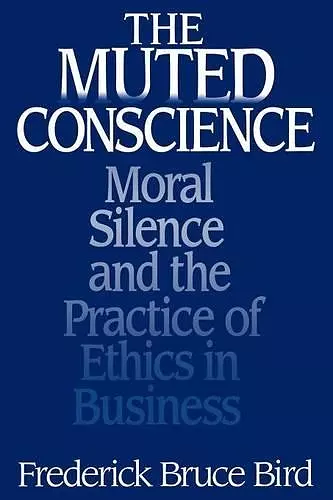The Muted Conscience
Moral Silence and the Practice of Ethics in Business
Format:Paperback
Publisher:Bloomsbury Publishing PLC
Published:30th Mar '02
Currently unavailable, and unfortunately no date known when it will be back

A new approach to understanding the nature of ethics and ethical decision making, not only in the context of business, but also in other life contexts.
In viewing business people's lack of voice on moral convictions as a moral silence, deafness and blindness, this work argues that the practice of ethics is a form of communication. It focuses on the factors that stifle communication and contains numerous case studies from business life.t's not that most businesspeople lack moral convictions. Rather, they tend not to voice them and are inattentive when others ^Udo. Bird sees this behavior as moral silence, deafness, and blindness, and, following this analogy to the senses, he argues that the practice of ethics is a form of communication. Thus, instead of focusing on specific moral issues, Bird examines the things that stifle communication about moral issues—factors that have a costly impact on business. His book presents a new view of ethics, in which ethics can be construed as a practical social activity, not a utopian concept to be contemplated in the abstract. With numerous examples and case studies from business life and a logical, sensible analysis of what causes moral silence, deafness, and blindness, Bird's book will be challenging reading not only for professionals and academics in various fields of business, but also for their colleagues in philosophy, religion, and the social sciences. The author begins by discussing the nature of moral silence in contemporary business and asks what kind of problem it is. He examines what it means to voice or not voice moral convictions and what it means to be inattentive or deaf to moral issues. He continues the analogy into moral blindness—the problem of not perceiving moral issues clearly. From there he explores the consequences of moral silence, deafness, and blindness and traces their causes to a variety of cultural, individual, and organizational factors, all of them interconnected. The book concludes with a way in which businesspeople and others can understand ethics as a social activity in which everyone can and must participate. Bird sees the practice of ethics as a form of conversation, a way in which people establish and maintain agreements among themselves, and in doing so help each other overcome their sensory incapacitations. Bird provides ways in which this can be done, from the use of workshops on interpersonal skills to seminars on conflict resolution—tools and aids that are already prevalent in organizations but that have not, until now, been seen as facilitators of moral awareness and action.
ISBN: 9781567205947
Dimensions: unknown
Weight: 425g
280 pages